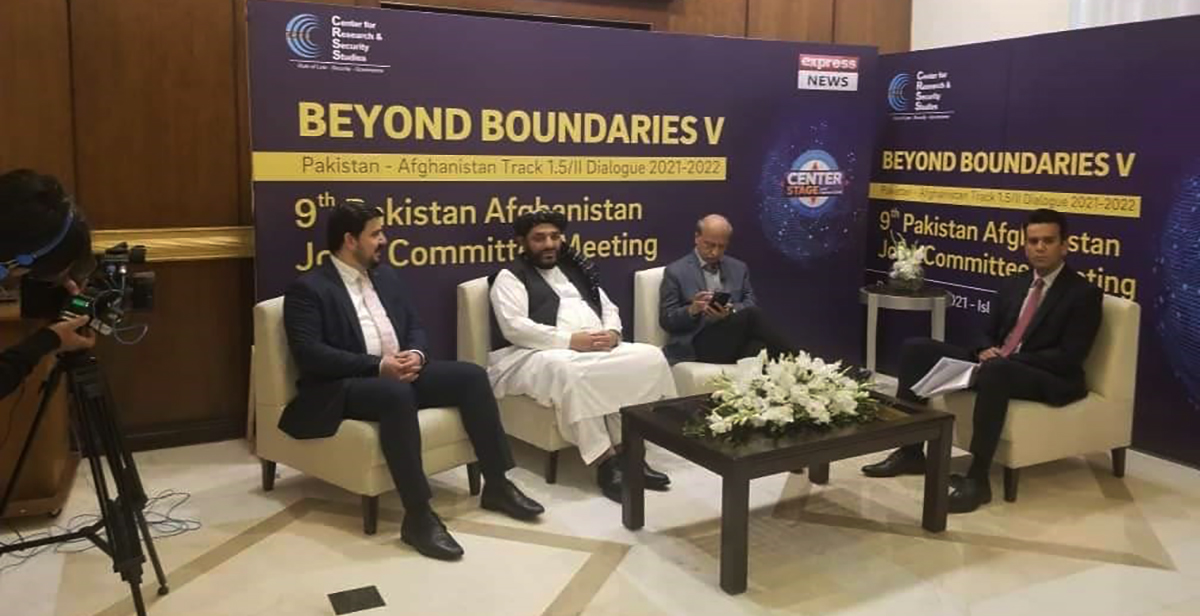EXECUTIVE SUMMARY
The swift power change in Afghanistan didn’t only cause political, economic, and social disharmony and uncertainty in the country, but also paved way for a massive humanitarian crisis. The sudden change of regime and lack of international recognition has multiplied the miseries of the Afghans. In order to discuss ways to support Afghanistan in these testing times and mitigate the challenges Afghanistan is facing in the health, education, and trade sector, the Center for Research and Security Studies (CRSS) organized its 9th Beyond Boundaries dialogue on December 14, 2021, at Islamabad. CRSS invited a 12 members senior- level delegation from Afghanistan to participate in this dialogue.
The delegation including former Members of Parliament; Gulalai Mohammadi, and Gul Ahmad Kamin; Khan Jan Alokozai, Co-Chairman Pak-Afghan Joint Chamber of Commerce and Industry (PAJCCI); Mohammad Yonas Hossain, Acting President Afghanistan Chamber of Commerce and Industry (ACCI); ; Mozammil Shinwari, Former Deputy Minister Trade and Commerce Afghanistan; Abdul Hakeem Mujahid, Former Permanent Representative of the Afghan government to the United Nations; Mukhlis Ahmad Younas, Advisor PAJCCI; Dr. Farah Naz Mustafawi, Social and Peace Activist; Shafeeq Ahmad Hassan, former Commercial Counsellor Afghanistan; Naqibullah Safi, Executive Director PAJCCI – Kabul; Abdul Rehman, Program Coordinator OESP, and Samira Shuja, Senior Journalist Ariana News; arrived in Pakistan on December 13, 2021, and was warmly welcomed by the CRSS team members. CRSS hosted a welcome dinner for the delegation upon their arrival.
The delegation met with senior government officials in the Beyond Boundaries Dialogue on December 14, 2021 and interacted with the members of Pak-Afghan Friendship Group along with other eminent government representatives in sideline meetings in Islamabad on December 15, 2021.
Beyond Boundaries interlocutors flagged major challenges faced by Afghanistan and proposed ways in which Pakistan can play its role as a neighbor to eliminate these challenges and facilitate the Afghans. At the end of the dialogue, participants from both countries drafted joint recommendations for the challenges discussed. Following recommendations were emanated from the dialogue, which were also tabled to the relevant authorities in both capitals for resolution of the discussed challenges.
JOINT RECOMMENDATIONS
- Trade and the Humanitarian Angle
Bilateral and transit trade should be seen through a humanitarian angle. Develop and agree on a ‘transitional assistance mechanism’ (keeping in mind humanitarian assistance) to circumvent the issue of recognition of the Taliban regime, as this may not happen for quite some time, and everything cannot be held hostage to this one step.
- Visa Regime and Border Control
- The duration of issuance of online visa to Afghans should be reduced to 5 working days instead of well over 40 days.
- Multiple intersecting agencies are operating at the Pakistan side of the border, which complicates the process for Afghans going to Pakistan. Having one agency to deal with incoming Afghans will save time and eliminate confusion among the visitors.
- Afghan patients visiting Pakistan for medical purposes should be facilitated by reducing both the visa issuance time, and the wait time for them at the border (overlap with below).
- Medical Tourism and Assistance
- Pakistani doctors should be sent to serve in Afghan hospitals. This will not only help Afghans but will also reduce the number of Afghans visiting Pakistan for medical tourism, lessening the load for both visa services and border control authorities.
- Pakistan should seek international funds to issue insurance to Afghans in the form of a health card which can be used in public/private health care institutions across Pakistan.
- Pakistan should collaborate with the Afghan government to establish healthcare and educational institutions within Afghanistan, to minimize refugee influx.
- Women’s Rights
- Pakistan should leverage their influence over the Taliban to ensure female participation in the formal and technical education sector.
- Pakistan should encourage the Taliban government to show improvement in upholding human and especially women’s rights, as it will ease the process of their international recognition.
- Pakistan should push the Taliban government for a meaningful inclusion of women in the higher echelons of power, especially when decisions regarding women’s role in the Afghan society are taken; these decisions cannot be made by men alone.
- Miscellaneous
- Dosti (friendship) bus should be resumed not just on paper but also in practice.
- Pakistan government should initiate a Training of Tutors (ToT) program, to train Afghan teachers.
BEYOND BOUNDARIES DIALOGUE- MAIN EVENT REPORT
CRSS arranged the ninth meeting of the members of Pakistan Afghanistan Core Committee as part of its track 1.5/2 initiative Beyond Boundaries, on Dec. 14, 2021.
Chairing the first session on regional economic connectivity, Ms. Shandana Gulzar, MNA, noted that after the swift power change in Afghanistan, the environment is challenging for Pakistan Afghanistan Friendship Group, especially with regard to cooperation from Afghanistan side. She also highlighted that Pakistan should address the misperceptions around the two countries’ economic relationship; highlighting virtues of revisiting agreements like Afghanistan–Pakistan Transit Trade Agreement (APTTA) in the best interest of bilateral and regional economic connectivity. Shedding light over Pakistan’s economic condition with reference to Afghanistan, she said that the corruption in Pakistan-Afghanistan trade is destroying former’s overall trade and better mechanism is essential to regulate the system.
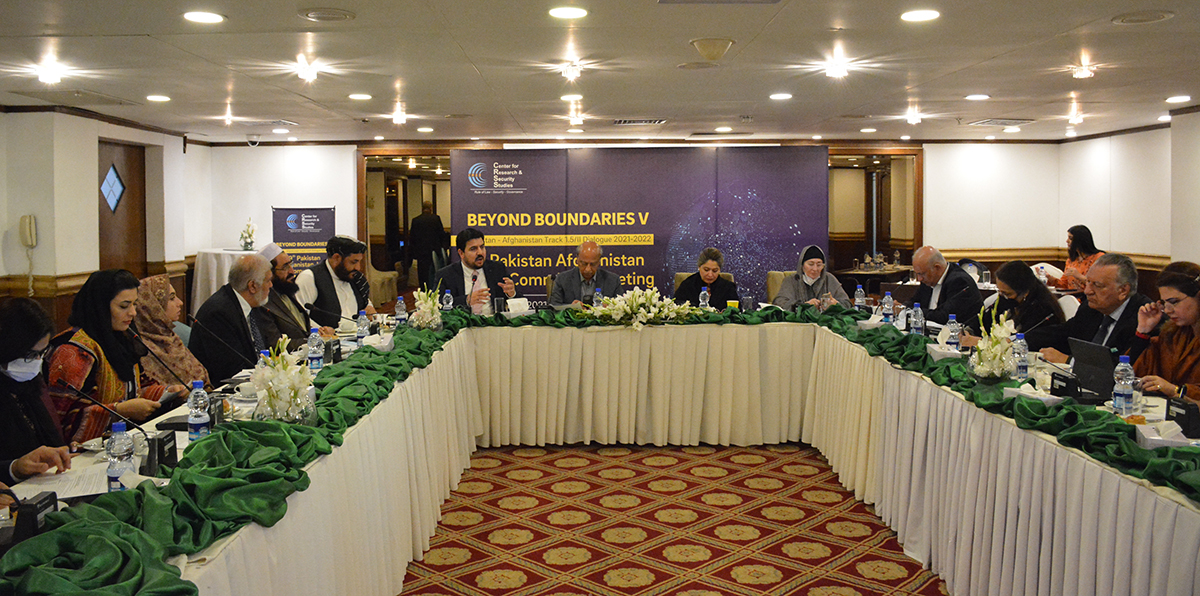
Apprising the delegates about the significance of border liaison committees for strengthening trade and transit trade between the two countries, she stated that both sides should form border liaison committees to immediately look into any issues that arise at the border crossing points which could eventually facilitate a smooth flow of trade.
Appreciating CRSS’ efforts to promote regional economic connectivity, Mr. Khan Jan Alokozai, stated that transit trade issues highlighted in the previous Focus Group Discussion – held by CRSS as part of Beyond Boundaries, in October 2021- have been resolved swiftly, resulting in smooth flow of trade between Pakistan and Afghanistan.
Moreover, he urged the State Bank of Pakistan to provide conducive environment to and facilitate Afghan traders, especially post August 15. He also added that a lesson learnt from history is the prevailing coordination gap between two governments which takes a serious toll on the economic relationship and both countries must build a robust coordination mechanism to ensure connectivity.
Seconding Shandana’s proposal, Mr. Muzammil Shinwari, former deputy minister for trade and commerce, stated that border committees comprising relevant officials, traders and other stakeholders, must be formed with the mandate to meet periodically, take up and solve trade related issues of concern for both sides. He accentuated that as important as revisiting APTTA, is the interpretation of this agreement by implementing authorities as it plays a crucial role, where misinterpretation can breed mistrust.
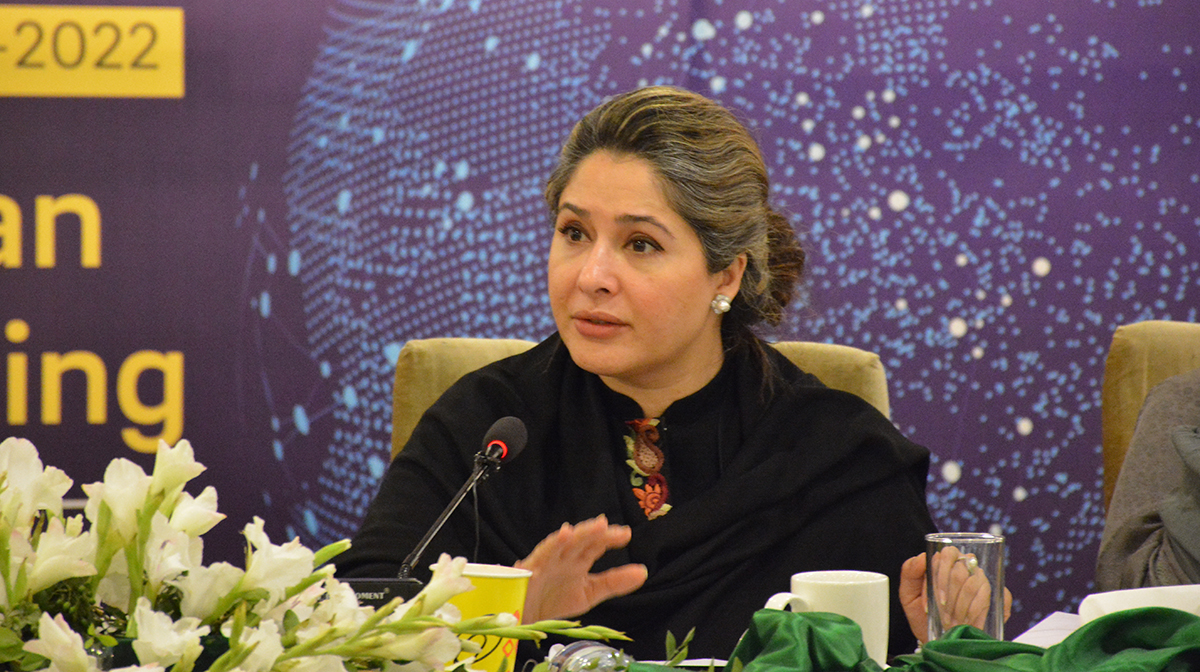
All the participants deemed the renegotiation of APTTA essential for boosting Pak-Afghan trade and laid immense stress on the need to revise APTTA as soon as possible to facilitate trade and transit trade between two countries.
Mr. Abdul Hakim Mujahid was of the view that the immense pressure of international community on Afghanistan and lack of recognition is detrimental to peace and stability in the country and government of Pakistan must play its role to relieve the pressure, as this international pressure isn’t allowing Afghanistan to stabilize and will dent Pakistan eventually.
Responding to Abdul Hakeem’s statement, Mr. Haroon Sharif, senior economist, stated that extraordinary situations need extraordinary solutions, hence Pak-Afghan trade regime must be facilitated and strengthened on humanitarian grounds and Afghanistan’s bilateral and transit trade needs should be seen through a humanitarian paradigm, especially post the Taliban takeover of the country.
Ms. Ammara Durrani, a senior development professional, suggested that since Pakistan and Afghanistan have a shared and connected future, they should operationalize trade and commerce as a matter of service delivery mechanism. She also added that there is a need to have level playing fields for both countries, as any arrangement that benefits one side only will not be successful in the longer run.
Highlighting the significance of the Pak- Afghan Friendship Group (PAFG) in smoothening the bilateral relationship, Ms. Nafeesa Khattak, MNA, noted that the resumption of PAFG meetings – in the near future – augurs well for two countries’ relationship, as this mechanism has a history of addressing several important issues related to visa, health, education and more. She also promised to flag the issues that visiting Afghans face on crossing points in the upcoming meetings of friendship group.
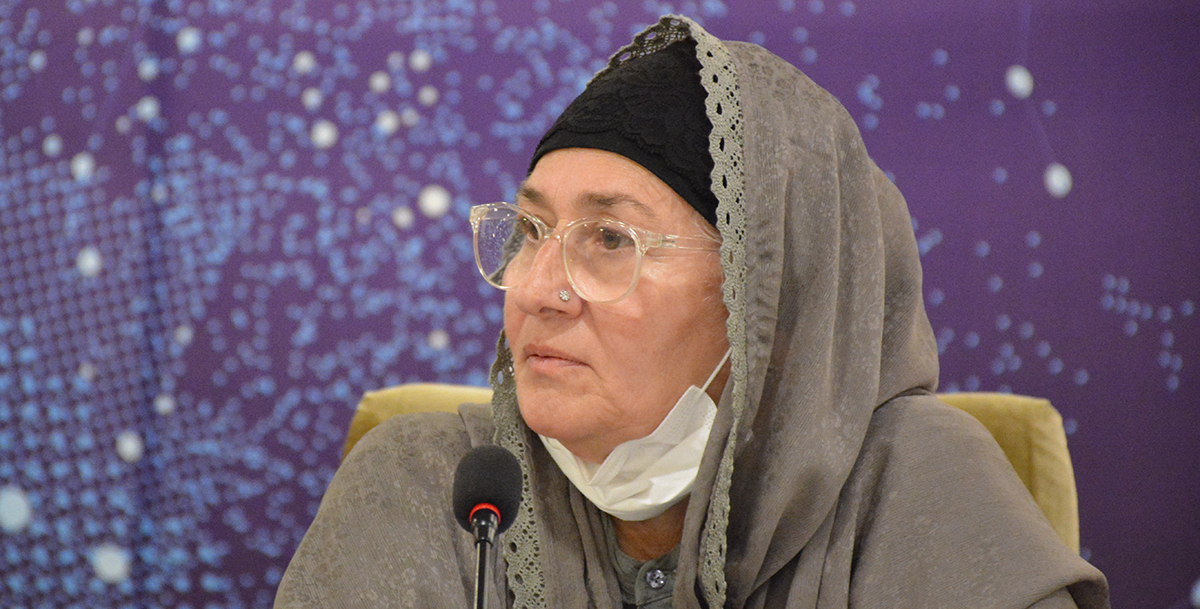
Restating the objective of the initiative, Executive Director CRSS, Mr. Imtiaz Gul said that multitrack diplomacy initiatives like Beyond Boundaries aim to focus on and propose solutions and demand their implementation by taking them up with the relevant government authorities.
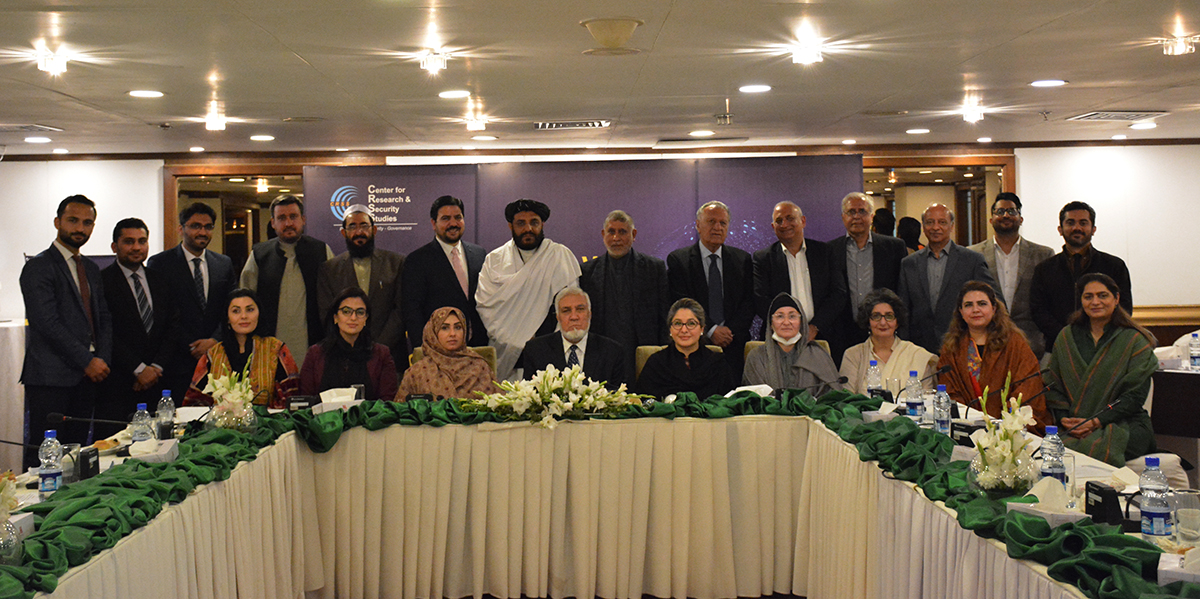
All the participants agreed that in order to support the long-suffering Afghan people, the international community needs to find a transitional assistance mechanism to circumvent the issue of recognition of the Taliban regime. Along with finding a transitional framework to regulate Afghanistan’s trade and transit trade and link it with humanitarian assistance. International community should support Pakistan to devise a system of health cover for visiting Afghans based on and utilizing its existing health card system’s infrastructure in place for its own citizens.
SIDELINE MEETINGS
The recommendations emanated in the BB dialogue were shared with H.E Ambassador Mohammad Sadiq and Mr. Arbab Shahzad, Special Assistant to Prime Minister on Establishment, on December 15, 2021, in a sideline meeting, held at Marriott Hotel, Islamabad. The meeting aimed to provide an opportunity to the Afghan delegation to present their issues directly to senior government representatives.
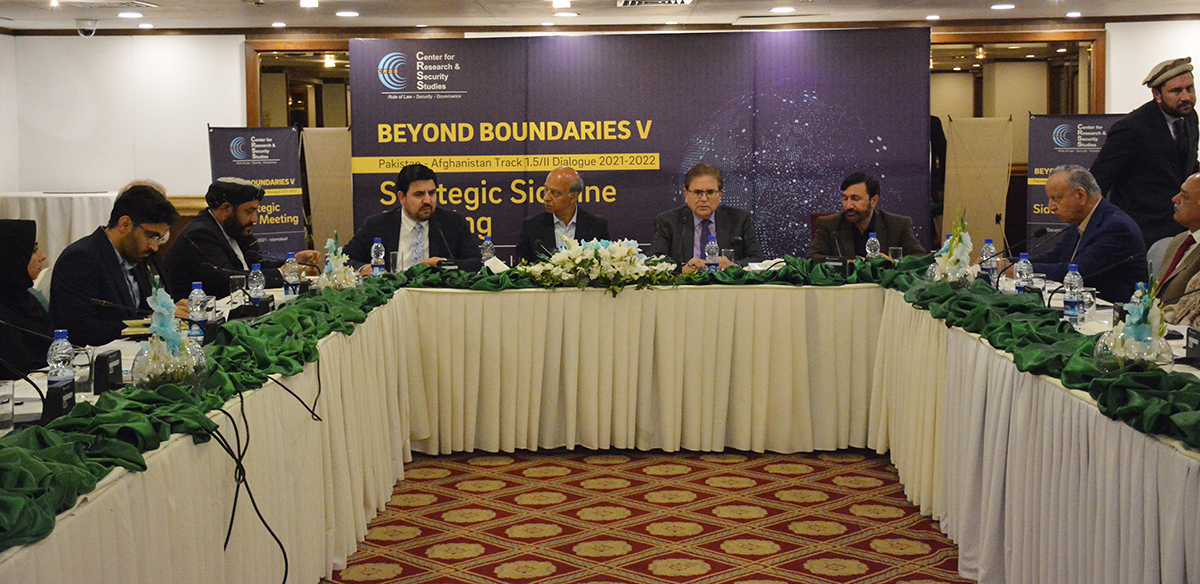
Thanking CRSS for arranging the meeting, Mr. Khan Jan Alokozai briefed the gathering that most of the recommendations made in the previous sessions of the programs have been materialized but few still lack implementation. Adding to Mr. Alokozai’s remarks, Mr. Mozammil Shinwari added that the recommendations emanated in the Dialogue must be taken up by the relevant authorities especially at the upcoming OIC conference to lobby the regional countries to cooperate for supporting Afghanistan.
While addressing the Afghan participants, H.E Ambassador Mohammad Sadiq, Pakistan’s Special Representative for Afghanistan, stated that Pakistan is making utmost efforts to facilitate the interim Afghan government and the local Afghans in all sectors. Addressing the problems raised by the Afghan delegation, Mr. Sadiq stated that Pakistan has evacuated around 92,000 people from Afghanistan post August 15. Also, Pakistan has issued most visas to the Afghans altogether as compared to the rest of the world during this time. Pakistan government has started free COVID-19 vaccination for the incoming Afghans. Around 3000 vaccines are being administered daily on Torkham and around 8000 at Chaman. Pakistan is also reaching out to international community to assist Afghans as economic sanctions will result in economic disaster and further brain drain in Afghanistan. Pakistan is having several discussions with Afghanistan to initiate barter trade between both countries. Pakistan is willing to train the Afghan doctors and paramedics to cope with the current health challenges. He added apart from these CBMs, in order to resolve the problems faced by Afghans at border crossing points, it is essential to explore the underlying reasons and mitigate them. While promising to resolve the issues impending Afghans’ travel to Pakistan, he urged the locals to cooperate with Pakistani officials in order to make their travel easy and smooth.
Adding to Ambassador Sadiq’s remarks, Mr. Sahibzada Sibghatullah, Member PAFG stated that Pakistan and Afghanistan are friends in peace, not in war. He also highlighted the significance of Pakistan’s centuries old people-to-people relations with Afghanistan in materializing cooperation in different sectors. He mentioned that Pakistan’s main focus is to support Afghanistan on humanitarian grounds and promote trade to bring people together.
Mr. Arbab Shahzad, Special Assistant to Prime Minister on Establishment, stated that APTTA revision is close to finalization and the revised agreement will be focused on facilitating Afghan traders. Highlighting Afghanistan’s significance for Pakistan to trade with the Central Asian Republics (CARs), he added that Pakistan has made Afghanistan the main beneficiary in its transit trade deals with the CARs. He also mentioned that in order to tackle the implementation issues, government of Pakistan has established an Afghan cell under the headship of National Security Advisor, Moeed Yusuf and the Prime Minister Imran Khan to monitor the Pak-Afghan people-to-people relations and flag the key issues to the cabinet for immediate resolution. He also assured that Pakistan will continue to facilitate Afghans in the future.
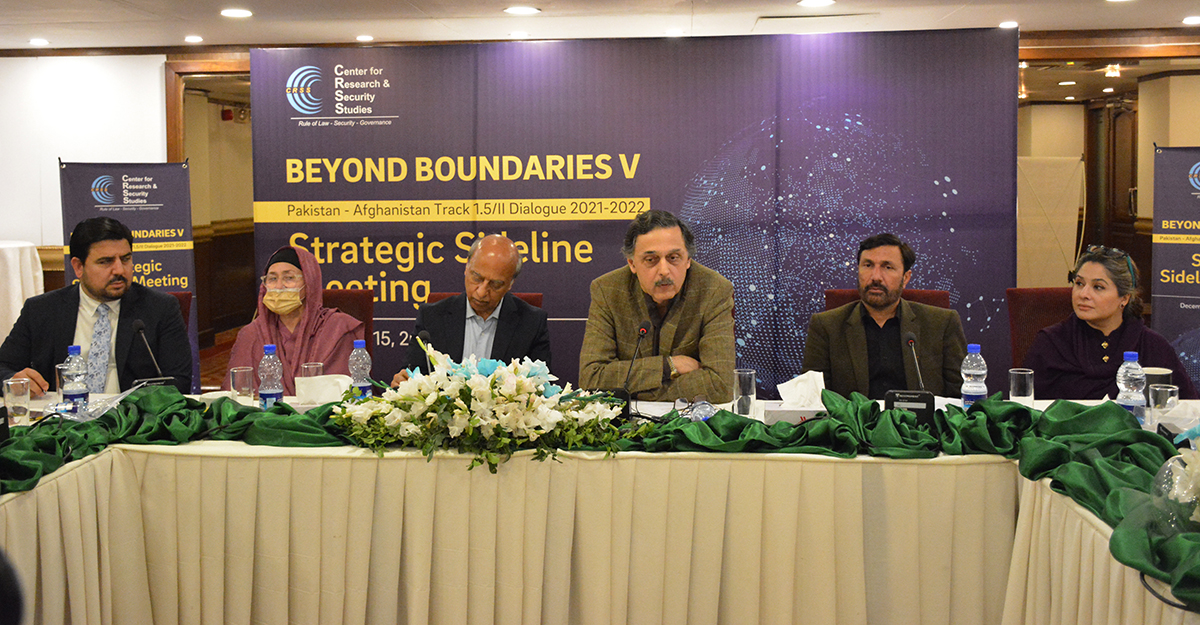
Discussing the issue of recognition of Afghanistan, Mr. Gul Ahmad Kamin stated that the only solution to improve Afghanistan’s problems is to accept the on-ground realities in Afghanistan and look for a joint cause that serves both Afghanistan and Pakistan.
In the concluding remarks, Mr. Qazi Humayun, former Ambassador, proposed that Pakistan should work on improving and using modern technology for the improving of bilateral relationships. Moreover, Pakistan needs to promote its softer image in Afghanistan through social and print media, as all of the efforts done by Pakistan largely go unnoticed.
Closing the session, Mr. Imtiaz Gul thanked all the participants and government representatives for contributing to this vital discussion. He suggested that in order to ensure smooth bilateral relations, such fora should be held regularly, as they allow interlocutors and subject matter experts to collectivity suggest tangible solutions to mitigate the challenges, which also support both governments in future policymaking.
TV PROGRAMME
At the conclusion of the dialogue, CRSS arranged a dedicated TV Programme in collaboration with Express News on the BB dialogue agenda items. The guests participated in the Programme were the core members of the Pak-Afghan Core Committee.
